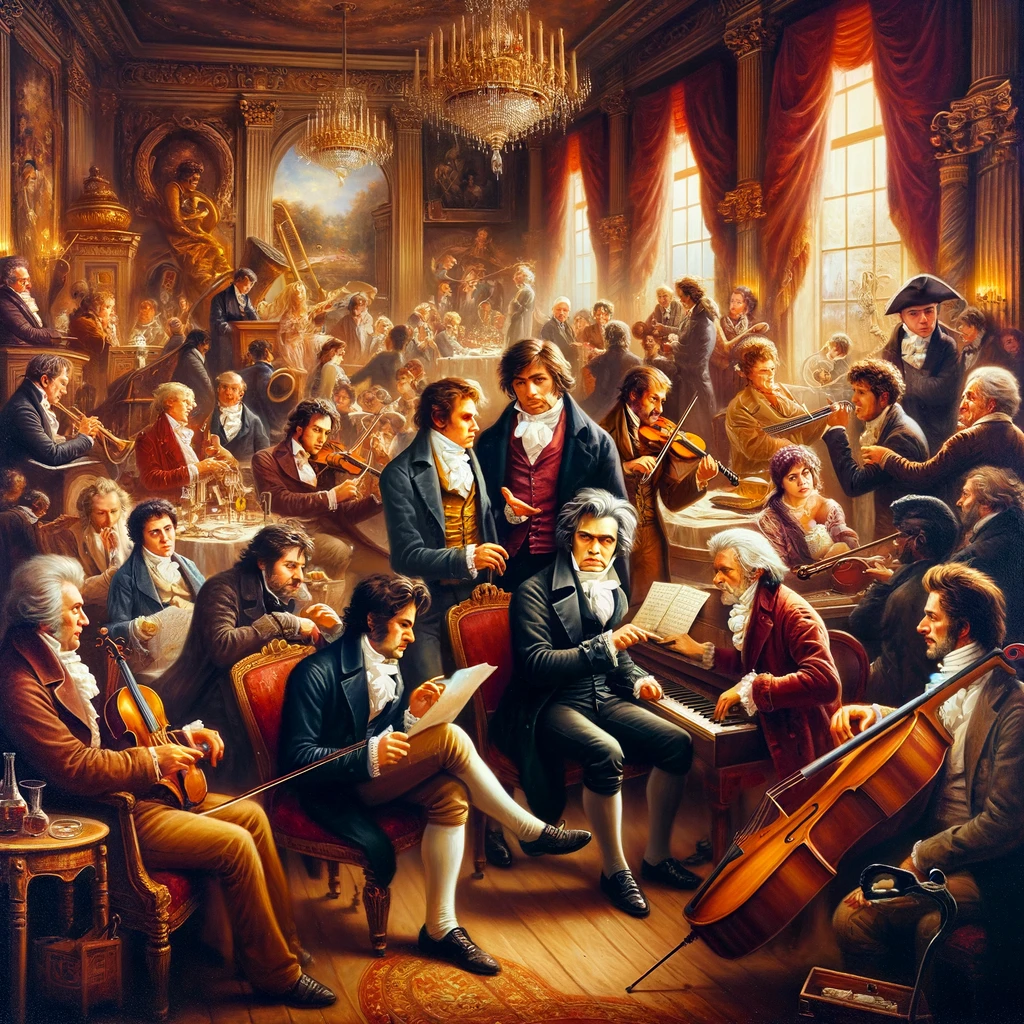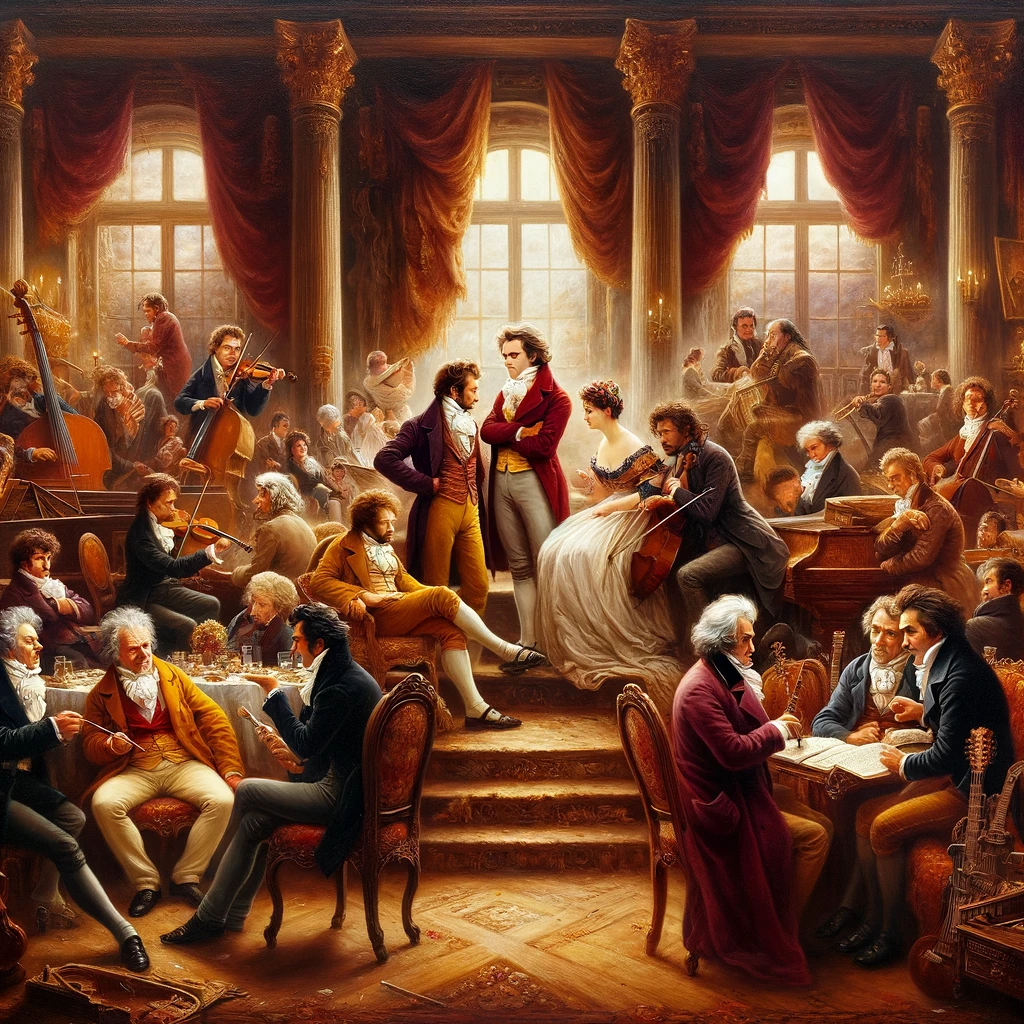
Beethoven’s Life: Late Years and Personal Struggles
Ludwig van Beethoven, a titan of classical music, navigated a life marked by personal trials, professional rivalries, and deep friendships. His later years, particularly from 1815 until his death in 1827, were a testament to his resilience and creative genius, despite immense personal challenges.
The Struggle with Deafness and Isolation
In his mid-20s, Beethoven began losing his hearing, a condition that worsened with time, leading to complete deafness by 1819. This affliction isolated him further in a life already marred by depression and a strained relationship with society. Despite his talent, Beethoven struggled with the reality of his condition, often feeling misunderstood by those around him. The loss of hearing profoundly impacted his life and work, yet he continued to compose some of his most celebrated pieces during this period.
Financial and Legal Turmoils
Beethoven’s later years were not just marked by his health but also by financial and legal troubles. His engagement in business matters often led to less than favorable outcomes. A significant source of stress was his guardianship of his nephew, Karl, after the death of his brother. The legal battle over Karl’s custody and their tumultuous relationship deeply affected Beethoven, contributing to his declining health.
The Influence of Contemporary Musicians
During these challenging years, Beethoven’s interactions with his contemporaries, including Haydn, Mozart, and others, played a significant role in his life. These relationships ranged from professional rivalries to deep, respectful friendships. The influence of these fellow musicians was evident in Beethoven’s evolving style, particularly in his later compositions.
A Genius Undimmed by Adversity
Despite his personal struggles, Beethoven’s later works, such as the Ninth Symphony, display a mastery and depth that surpass his earlier compositions. His ability to transform personal suffering into profound musical expression is a hallmark of his genius. The challenges he faced, including his deafness and the complex relationship with his nephew, seemingly fueled his creative process, leading to some of the most memorable and impactful music in history.

The Late Period: Masterpieces Amidst Personal Strife
The Onset of Deafness and Its Impact
The onset of Beethoven’s deafness, which began in his late twenties, culminated in total deafness by 1819. This impairment significantly impacted his personal and professional life. He could no longer perform publicly, and it impeded his ability to communicate, leading to a reclusive lifestyle. Despite these hurdles, Beethoven’s creativity soared, evident in the depth and complexity of his late compositions, like the Ninth Symphony.
The Unraveling Relationship with Karl
Beethoven’s relationship with his nephew, Karl, was fraught with challenges. After taking over his guardianship, Beethoven’s domineering nature and Karl’s struggle for independence led to a strained and tumultuous bond. This period was marred by legal battles for custody and Karl’s tragic suicide attempt, deeply affecting Beethoven both emotionally and in his work.
Financial Distress and Business Endeavors
Beethoven’s later years were also marked by financial distress. His involvement in various business matters often led to unfavorable outcomes, exacerbating his personal struggles. However, he found some relief through commissions, like the one from the Philharmonic Society of London, which spurred the creation of significant works including the Ninth Symphony.
Contemporaries: Rivalries and Friendships
Despite his isolation, Beethoven maintained interactions with other eminent musicians of his time. His relationship with contemporaries like Mozart and Haydn ranged from respectful admiration to professional rivalry. These relationships influenced his musical style, particularly evident in his later works, where he embraced and transcended the prevailing musical trends of the time.
The Creative Process in Isolation
Beethoven’s creative process during his deafness was extraordinary. He relied on sketchbooks, jotting down musical ideas that later evolved into full compositions. These books reveal his meticulous approach to composition and his ability to work on multiple pieces simultaneously. His later works, enriched by his personal struggles, exhibit a depth and emotional intensity that remain unparalleled.
Beethoven and Women
Beethoven’s romantic life was complicated and mostly unfulfilled. His attachments to various women, including Giulietta Guicciardi and Josephine von Brunsvik, influenced his compositions but never culminated in marriage. The mystery surrounding his “Immortal Beloved” letters adds to the intrigue of his personal life, reflecting his deep but often unrequited affections.
Conclusion
Ludwig van Beethoven’s later years were a blend of profound personal struggles and remarkable creative achievements. His journey through deafness, challenging relationships, financial difficulties, and complex interactions with contemporaries culminated in some of the most profound music ever composed. Beethoven’s legacy is not only in his music but also in his resilience, turning personal adversity into timeless art that continues to resonate across generations.
References
- Swafford, J. (2015). “The Difficult Life of Ludwig”. Tufts Now. Retrieved from Tufts Now
- “Ludwig van Beethoven – Composer, Symphony, Death”. Britannica. Retrieved from Britannica
- “The Life And Struggles Of Ludwig Van Beethoven”. Mozart Project. Retrieved from Mozart Project
- “Ludwig van Beethoven – Composer, Deafness, Symphony”. Britannica. Retrieved from Britannica
- “Beethoven and women”. Britannica. Retrieved from Britannica
- “Beethoven and Karl: A Complex Relationship”. LVBEETHOVEN.COM. Retrieved from LVBEETHOVEN.COM